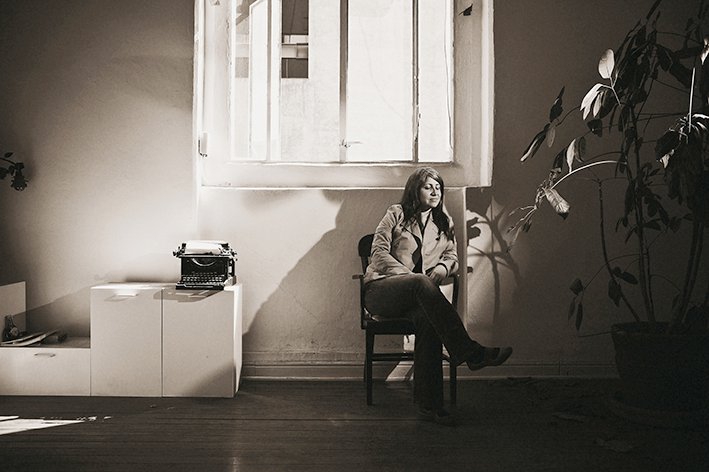 TED Senior Fellow alumna Gabriella Gomez-Mont made a suprise appearance at TED2013 with some incredible news – she’s just been appointed chief of Laboratory for the City (Laboratorio para la Ciudad), a creative think tank for Mexico City that aims to make it not only the most vibrant and sexy city in the world, but an experimental lab for City 2.0. The cultural curator of Tóxico Cultura tells how she tells how she landed herself the job, almost by accident, via a TEDx event.
TED Senior Fellow alumna Gabriella Gomez-Mont made a suprise appearance at TED2013 with some incredible news – she’s just been appointed chief of Laboratory for the City (Laboratorio para la Ciudad), a creative think tank for Mexico City that aims to make it not only the most vibrant and sexy city in the world, but an experimental lab for City 2.0. The cultural curator of Tóxico Cultura tells how she tells how she landed herself the job, almost by accident, via a TEDx event.
So now you’re a bureaucrat.
I’m a bureaucrat! I still can’t believe it. I’ve been a bureaucrat for a whole week. I would have never thought. I’ve worked in the independent space for mostly my whole working life. And suddenly in a weird, serendipitous, strange zigzagging road, TED led me right into the bureaucratic structure of Mexico City government.
How did it happen?
About six months ago, I organized a TEDx with two good friends of mine. And we decided to invite Dr. Miguel Angel Mancera, our then mayor-to-be, to speak. He was running for mayor at the time, but everybody knew that he was going to win. We also chose as other speakers people that we thought it would be fascinating for him to hear about – people who have really great ideas for Mexico City. And as well as seeing a huge richness that already is, we also feel that there is enormous potential to make it an even more exciting city.
After that, I got an invitation to propose a project. At first, I thought they would be willing to fund some things on the outside, but it turns out that he invited me to jump on his team.
What did you propose?
It was a project that is called Laboratory for the City. This would be Mexico City’s new creative think tank. This is not a space that exists in any other government in the world.
One of the things we will be doing is to incubate good ideas and create pilot programs. We’ve been very much inspired by, for example, a project in Boston called New Urban Mechanics that’s directed by Nigel Jacobs. They are creating an incubator of good ideas from civil society and inside of government, working as a more experimental space that can mitigate risk. They’ve done amazing stuff, from working with a mother whose kid has autism to create all sorts of tools that she’d been working on informally that will now be implemented in public schools, to, for example, these apps where you can report if there’s a pothole.
If and when ideas prove successful in the experimental space, then we can actually work with other departments to inject these ideas into a more formal structure.
I’m also super excited that this is going to become a space to think about the city in a multidisciplinary manner. It’s very much akin to what I had been doing with Tóxico Cultura, and it also very much incorporates what I’ve learned from three years as a TED Senior Fellow.
I met my mayor because of a TEDx, but the reason why I got offered this job is because, through TED, I’ve been put through a three-year school dealing with things that not only have to do with art and culture, but a lot to do with technology and innovation – basically pushing forth a series of conversations that are not only related to arts and culture.
So what’s your vision?
We’d like for this to become a vortex to think about the city as a concept, and a place to invite people in from all over the world, across disciplines, to try out new ideas. In a conversation with a friend recently, we discussed how it hasn’t been since modernism that the concept of what a city is has been so much up for grabs. What is a digital city? What is a smart city? Is densification a good thing?
Mexico City, which has been a megalopolis since Aztec times, was the poster child of everything a city should try to avoid. We have all the problems of an emerging-world city: social divide, pollution, problems with water, you name it. But now, Mexico City has a great potential to be the epitome of a city that can prototype ideas. It has an absolutely enviable infrastructure, and it’s the eighth largest city economy in the world. This is not something that a lot of people know. Because there’s densification, there are many interesting minds that are there to clash and meet and breed ideas, as Matt Ridley would say. And we just got a prize for sustainable transport, competing against smaller cities like Copenhagen.
Basically TED has been fundamental in pushing this forth in a strange serendipitous way, preparing the mindspace for all that is coming. How can we create cities together? What is needed for Mexico City to become one of the world’s sexiest, most interesting cities?
Comments (4)
Pingback: Future Everything Day 2: What now for democracy? And the weird and wonderful? |
Pingback: Wizmo Blog » Blog Archive » Sexy city: Gabriella Gomez-Mont appointed head of Mexico City’s creativity lab